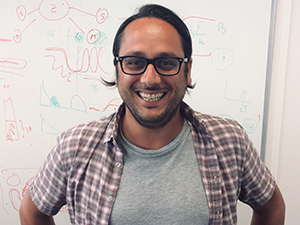The Institute of Cancer Research, London, has welcomed the approval of a new combination of two drugs for ovarian cancer by the US regulatory body the Food and Drug Administration (FDA).
The approval comes following a long-running research collaboration between the pharmaceutical company Verastem Oncology, The Institute of Cancer Research (ICR), and our partner hospital the Royal Marsden NHS Foundation Trust, which also included the company Chugai Pharmaceuticals.
The ruling from the FDA means the combination of the two drugs – which have the generic names avutometinib and defactinib, now branded Avmapki and Favzynja – will be available for patients in the US with a specific type of low grade serous ovarian cancer.
Judgements from other regulatory bodies are due to follow in the coming months, including in Europe.
Clinical trials
The primary basis for the approval was data from the RAMP 201 trial, which was led by Professor Susana Banerjee, Consultant Medical Oncologist at The Royal Marsden and Group Leader in Women's Cancers at the ICR.
The RAMP 201 trial followed on from another clinical trial led by researchers at the ICR and the Royal Marsden called FRAME, which was the first to test the drug combination.
Researchers began FRAME after realising that the two drugs together could work against a notoriously hard-to-treat subset of cancers, driven by mutations to a protein called KRAS.
The approval is the first worldwide for any treatment for KRAS-mutated, recurrent low grade serous ovarian cancer (LGSOC).
The ICR and The Royal Marsden are a leading centre for early-stage clinical trials in oncology, trialling dozens of candidate drugs at any one time in collaboration with industry partners.
The joint Drug Development Unit, based in Sutton, south London, trials up to 50 novel drugs at any one time, in around 300 patients per year.
Professor Udai Banerji, Co-Director of Drug Development at The Institute of Cancer Research, London, and The Royal Marsden NHS Foundation Trust, who led the FRAME trial, said:
“We are delighted that the FDA has approved avutometinib in combination with defactinib for patients with KRAS-mutated, low-grade serous ovarian cancer. We’re proud that the approval arises from a long-running research collaboration between Verastem and the ICR and the Royal Marsden NHS Foundation Trust.
“When we try to develop new cancer drugs, we need to come up with innovative ways of both shrinking the tumour and managing side effects, so they are tolerable for patients. The Phase I FRAME trial showed that avutometinib could be given in an unconventional, innovative, twice-weekly schedule to deliver its potent anti-tumour effects while minimising side effects.
“The successful licensing of avutometinib and defectinib for this group of patients is the result of the unique collaborative working relationship between the ICR and the Royal Marsden NHS Foundation Trust, which allows the two-way flow of research information between the laboratory and clinical trials – a prime example of the ‘bench to bedside and back again’ model.
“I am proud of the many firsts this registration brings including first registration of a FAK inhibitor drug, the first registration of a dual RAF-MEK clamp, a type of drug that blocks both RAF and MEK proteins and the first registration of a targeted therapy for low grade serous ovarian cancer.”
Professor Susana Banerjee, Consultant Medical Oncologist and Research Lead for the Gynaecology Unit at The Royal Marsden NHS Foundation Trust and Professor in Women’s Cancers at The Institute of Cancer Research, London said:
"To see our early research in both the FRAME and RAMP 201 trial in recurrent low-grade serous ovarian cancer advance the combination of avutometinib and defactinib to now be the first-ever FDA-approved therapy for this disease is what gives us real hope when treating patients with rare or difficult-to-treat gynecological cancers.
"With this approval, we thank all of the patients and researchers who participated in this trial, and the low-grade serous ovarian cancer community for their contributions to help bring the first FDA-approved treatment for KRAS-mutated recurrent LGSOC.
“We now need to build on this milestone to bring this new treatment to patients around the world.
“The Ramp 301 study is ongoing and will investigate this combination further in patients with and without genetic mutations. We look forward to seeing the results of this study.”
.tmb-propic-md.jpg?Culture=en&sfvrsn=c25d2b2f_9)
 .
.
